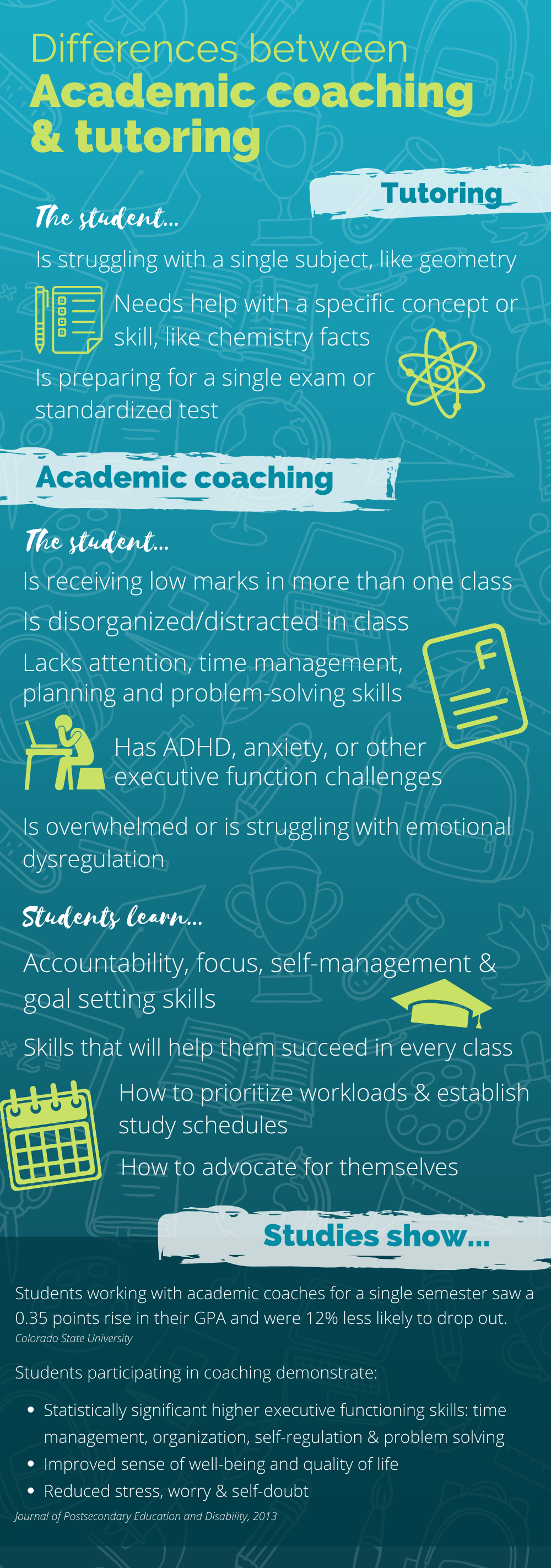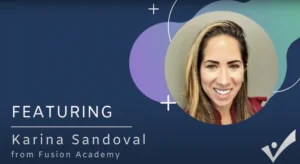The difference between academic coaching and tutoring
- thrivister
- October 29, 2021
If you’re unfamiliar with academic coaching, you might assume this service offers similar benefits to traditional tutoring. While there is some overlap between the two, coaching and tutoring are different in their procedures and fundamental purposes.
Academic coaching is about how you learn, not always what you learn
Unlike a tutor, an academic coach works with students to build habits and routines that they can use in all of their classes and throughout their entire academic careers (and beyond!). Coaching is not a quick fix when a student is having a hard time comprehending complex math formulas or chemistry equations, but rather a longer-term solution for students who are struggling across the board.

Coaching is about how students learn, not just what they learn. Tutoring is about the depth of a subject, while academic coaching sets the stage for the breadth of learning through strengthening executive functioning skills.
Of course, focused problem-solving can be part of coaching too, but every skill is practiced and developed in a way that builds on itself in order to reach a larger goal. Academic coaching helps students create long-lasting transformations like developing independence, confidence, coping skills, and healthier habits that lead to success.
Students who might benefit from academic coaching:
- Are receiving low marks in more than one class
- Are disorganized or distracted in class or during study sessions
- Procrastinate/lack focus or time management skills, often missing assignment deadlines
- Have ADHD, anxiety, or other challenges that impact executive function skills
- Are easily overwhelmed or struggle with managing their emotions/behavior around school work
The Difference between an Academic Coach and A Tutor
Academic coaches are professionally trained or credentialed. Many have specialties and certifications in ADHD, Education, Graduation Counseling, Academic Counseling, ICF Coaching, Life Coaching, Master’s in Psychology, Master’s in Education, and other higher education degrees and experience that make them strategic and effective coaches.
In comparison, tutors are often your friendly neighbor or college student that has an aptitude for a specific subject like math, reading, or writing. Though some tutors may be educators that tutor on the side, there are no standard qualifications to ensure a tutor’s effectiveness or level of knowledge. This doesn’t mean tutors can’t be a huge asset to struggling students. However, using them in conjunction with a coach is often more effective.
These differences also highlight the reason a tutor can cost less than an Academic Coach.
In addition to their degrees, certifications, and professional experience Thrivister Coaches are also credentialed in our Executive Function Coaching Method called, C.O.P.E. This method was developed by our Thrivister Co-Founder, Michelle Raz M.Ed., BCC, CSS and has been used to coach hundreds of students successfully over the last 10+ years.
How academic coaching works
One of the most important things an academic coach does is build relationships with the students that they work with. Before creating an academic action plan, coaches take the time to get to know a student’s unique strengths, struggles, and goals. Genuine connection and rapport help students feel comfortable with the vulnerability and honesty that’s necessary to uncover the root causes of their learning difficulties—whether that’s a lack of focus, motivation, organization, or confidence.

Coaches get to know their students through questionnaires, consultations, and/or feedback from the student’s parents. Family relationships can be negatively impacted by academic challenges—good-intentioned parents who are trying to help may be unintentionally causing their child to feel micromanaged or less capable. Understanding family dynamics helps coaches assume the role of an accountability partner for the student, taking the pressure off of their parents.
The academic coaching process can vary greatly depending on the organization and the experience/teaching preferences of a coach. At Thrivister, our coaches work within the framework of our tried-and-trusted COPE Method to help students succeed in four areas: accountability, focus, self-management, and empowerment & goal setting.
Here’s what the process looks like:
- Collect & analyze. A coach will help students figure out where to find the academic information they need—what their assignments are and when they’re due; what supports they need and how to get them (ie. accommodations, counseling, etc.)
- Organize the information. Coaches help students take this information and organize it in their planners. They prompt students to break down larger tasks like papers, tests, and projects into chunkable steps and actionable end goals.
- Prioritize & prepare an action plan. After gathering and organizing academic information, coaches help students prioritize what needs to happen in sequential order. This step takes into account other obligations like a job or extracurriculars that can get in the way of schoolwork, and find ways to work around them.
- Execute the plan & be accountable. What good is an organized & prioritized plan without it getting done? This is the most important part of the COPE method—time to take action. Coaches guide students through the steps to take for each goal in a verbal, kinesthetic and auditory process that accommodates all learning preferences. The methods and tactics for knowing if and when each goal is met are identified and put into place, helping students stay accountable. A color-coded system, built-in check-ins, and text reminders throughout the week help students stay on track.
Benefits of academic coaching
The benefits of coaching are often longer-term and more tangible than the outcomes of traditional tutoring. Not only are students learning skills that apply across every subject, but they are also strengthening executive functioning skills that will serve them well in personal relationships and future academic and career goals. In addition, taking charge of their academic responsibilities helps students build their confidence, intrinsic motivation, and feelings of self-reliance.
In one study from the University of Colorado, students working with academic coaches for a single semester saw a 0.35 points rise in their GPA and were 12% less likely to drop out. The study also found that “students show behaviors indicative of greater self-awareness. They regularly reflect on their strengths and weaknesses, and they gain the ability to determine the skills and resources that work best for specific problems.”
Some of the other skills students learn through coaching that they don’t in traditional tutoring programs are:
- Setting daily routines to bridge school-home time
- Being accountable for setting and achieving goals
- Staying on track and turning in assignments on time
- Establishing and sticking to a study plan to prepare for tests
- Knowing when they need extra help and how to advocate for themselves
- Learning to prioritize workloads by creating and following a plan that is unique to them
There is no one-size-fits-all solution to helping students overcome learning difficulties–but academic coaching is the closest you can come to a truly tailored plan for your student. For more information or to take the executive function skills assessment, check out our How It Works guide, or contact our team with any questions.

M.Ed., BCC, CSS and Co-founder of Thrivister
As co-founder of Thrivister, my purpose and passion is to help young adults with executive function challenges to thrive: manage, organize and be successful in their academics, careers and life. My successful EFS Coaching Method and journey as an ADHD coach, career service specialist, author, blogger, podcaster and board-certified coach for over a decade, has laid the foundation for our platform.
We believe opportunities are plentiful for someone with executive function challenges when they have the support and resources behind them. It is our mission through Thrivister to help as many people as possible be successful academically and into their future careers and life.

7 Trailblazing Celebrities and Icons Living & Thriving with ADHD
Explore the inspiring journeys of 7 influential individuals who have harnessed their ADHD to achieve greatness and make a lasting impact.

Unveiling the Complexities of ADHD: Insights from Dr. David Pomeroy
Unveiling the Complexities of ADHD: Insights from Dr. David Pomeroy https://youtu.be/EotABukIxlo Attention Deficit Hyperactivity Disorder (ADHD) is a multifaceted condition that impacts millions of lives

Navigating ADHD in Teens: Insights from MFT, Kelsey Thompson
Navigating ADHD in Teens: Insights from MFT, Kelsey Thompson https://youtu.be/omQndscdD5U In a recent interview with Kelsey Thompson, a seasoned Marriage and Family Therapist at The

Unlocking Potential: A Glimpse into Fusion Academy’s Personalized Education Model
Unlocking Potential: A Glimpse into Fusion Academy’s Personalized Education Model https://youtu.be/R7BgYW6A6k4 In the bustling world of education, where traditional models often struggle to meet the

